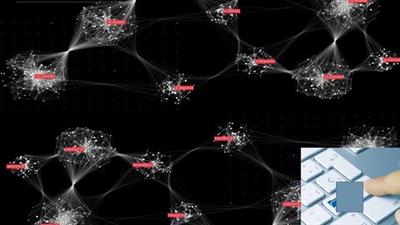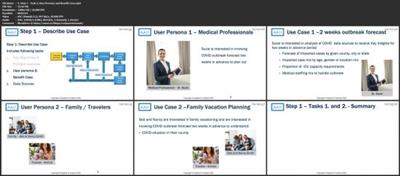Genre: eLearning | MP4 | Video: h264, 1280x720 | Audio: AAC, 48.0 KHz
Language: English | VTT | Size: 3.2 GB | Duration: 7h 28m
Gain hands-on experience in building a Data Driven AI engagement using Python
What you'll learn
Students will learn proven modified CRISP-DM methodology to deal with big data challenges as we move from BI world to AI world
Students will use real case study for this data science project and will gain hands-on experience in Designing / prototyping a Data science engagement on the chosen case study. You will be able to use the results in your day-to-day life.
We divide the data scientists into clickers and coders. Clickers Examples include SPSS Modeler, Excel and Alteryx. This course is for coders not Clickers. For clickers we have designed similar courses like "Data Science Methodology" and "Data Science in Action using Alteryx"
This course is designed for data scientists and data engineers who use a procedural language with libraries to write code for data science work. This course uses Python to show all necessary steps and activities needed for successful data science engagement.
Description
With explosive growth of data in unstructured data, we have ample opportunities to design, develop and deploy AI models. While there are many courses which teach you Data Science, you need a step-by-step guide on how to select a problem, explore data, develop and deploy models and improve the model using user feedback and learning. This course covers many big data challenges and modifies CRISP-DM to deal with big data. This course provides you a methodology for AI model development and deployment as modified by us to deal with AI and big data. Our modifications have been tried on a number of real-life large-scale projects. We will select a real case study for this data science project and will provide hands-on experience in Designing / prototyping a Data science engagement on the chosen case study. You will be able to use the results in your day-to-day life.
We divide the data scientists into clickers and coders. Clickers are those data scientists who use a data science tool with a user interface to provide a high-level specification. Examples include SPSS Modeler, Excel and Alteryx. In each case you can add formula, but do not need to write code. The second set of data scientists are those who use a procedural language with libraries to write code for data science work. Python is the most popular language among data scientists. The objective of this course is to get you an introductory coding experience in data science. If you are interested in a clicker course, we offer a course using Alteryx for exactly the same content. In addition, Our data science methodology course is also designed for Business Analysts and Project Managers with limited development background.
Course starts with two critical activities
Set up Environment - step by step instructions in preparing sandbox environment for executing all your python code
Data Science Methodology - to review key steps, tasks and activities associated with our data science methodology
After above section, This course introduces our 7 step data science methodology and use Python to explain each step using our real life use case example . These 7 steps include
Step 1: Describe Use Case to explain selected use case for data science work
Step 2: Describe Data to describe Data Sources and explain data sets using Python as a language.
Step 3: Prepare Datasets to Prepare Data Sets using Python
Step 4: Develop Model will provide hands-on exercises in applying many AI modeling techniques on data sets such as time series analysis, classification, clustering, regression, and forecasting,. All these exercises will be using Python as a language.
Step 5: Evaluate Model will provide measurements to Evaluate your AI Model Results
Step 6: Deploy Model will provide process for deploying your AI models.
Step 7: Monitor model will provide process for continuous monitoring and evaluating your models in production
In this course, we will give you an opportunity to design a use case and then work on its implementation using Python as your primary language. You should download all data sets and sample python code. Complete all assignment in each section of the course and submit your final notebook using instructions provided.
Who this course is for:
This course is for anyone interested in becoming a data scientist such as Students, Business Analysts, Developers Testing professionals
There are four possible careers where this course can be used as introductory material such as data scientists, AI or automation engineer, test engineers and finally knowledge engineers
Screenshots
Download link:Kod:rapidgator_net: https://rapidgator.net/file/0b1456e531f1e52dba84df37c92fae06/udmm0.Data.Science.in.Action.using.Python.part1.rar.html https://rapidgator.net/file/9c05477a938c246a2c220906f775fc06/udmm0.Data.Science.in.Action.using.Python.part2.rar.html https://rapidgator.net/file/f4c4cfd46a18111b0cc26dc95a923592/udmm0.Data.Science.in.Action.using.Python.part3.rar.html https://rapidgator.net/file/f3896985c0008f5467fb4d6fdb2cf5e1/udmm0.Data.Science.in.Action.using.Python.part4.rar.html nitroflare_com: https://nitroflare.com/view/9DC3E39249186C7/udmm0.Data.Science.in.Action.using.Python.part1.rar https://nitroflare.com/view/93546868418DC60/udmm0.Data.Science.in.Action.using.Python.part2.rar https://nitroflare.com/view/DFA8141A05E5620/udmm0.Data.Science.in.Action.using.Python.part3.rar https://nitroflare.com/view/4AB716D21FEBD8A/udmm0.Data.Science.in.Action.using.Python.part4.rarLinks are Interchangeable - No Password - Single Extraction
1 sonuçtan 1 ile 1 arası
-
11.04.2021 #1Üye



- Üyelik tarihi
- 20.08.2016
- Mesajlar
- 144.947
- Konular
- 0
- Bölümü
- Bilgisayar
- Cinsiyet
- Kadın
- Tecrübe Puanı
- 153
Data Science in Action using Python
Konu Bilgileri
Users Browsing this Thread
Şu an 1 kullanıcı var. (0 üye ve 1 konuk)



 LinkBack URL
LinkBack URL About LinkBacks
About LinkBacks






 Alıntı
Alıntı
Konuyu Favori Sayfanıza Ekleyin